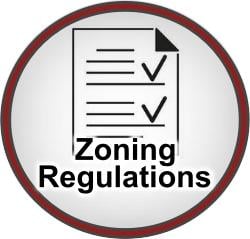Zoning laws are found in virtually every municipality in the United States, affecting land use, lot size, building heights, density, setbacks and other aspects of property use. Your property is controlled by our local zoning laws. The zoning ordinance does not regulate matters such as private deed restrictions, noise and other complaints similar in nature. Your Realtor can give you more details about zoning in the area where you live.
How much do you know?
» What is the purpose of zoning?
Each zone is assigned for a specific purpose such as residential, industrial, commercial, etc. These laws prohibit the construction of commercial real estate in a residential zone. Zoning ensures lands are used for purposes that flow naturally and the development of areas is complementary.
» Who controls zoning?
Zoning is commonly controlled by local governments. Your zoning is regulated by the county or city where you live.
» What zone do I live in?
It is likely that you live in R-1 (single unit housing). The R-1 zoning district is intended to provide areas appropriate for a range of detached single-family residential dwelling units, each locates on a single legal lot. It does not includes condominiums or cooperative housing.
» If I live in R-1, can I rent out my basement apartment?
Most R-1 zoning allows you to rent your house or rent your basement apartment as long as you are living in the house. Check with your local zoning authority for details.
» How many types of zoning are there?
There are quite a few, but the most used are “R” for residential, “B” for business, “I” for industrial and “C” for commercial. Each category has subcategories that break down the type, size and use for the buildings. It is interesting you can live in a house that is in a business or commercial zone, but a business could almost never be located in a residential zone. Thee could always be exceptions (zoning variance).
» Why do I care?
It’s important you know what type of zoning affects your home. Your Realtor can help you. You also can call your city or county zoning office. You wouldn’t want to rent out your home and its basement or garage apartment only to find out it is not allowed where you live. You wouldn’t want to purchase a home where you also plan to have a business and later find out that zoning prohibits that usage.
» What regulates my home other than zoning?
If you live in a neighborhood where there is a homeowner’s association (HOA), then that association will have additional rules you must follow. Zoning rules always are superior to HOA rules. If you’re building a home, there are additional rules you must follow.
If you’re confused or worried, call your Realtor, who will know how to get you the answers you need.


